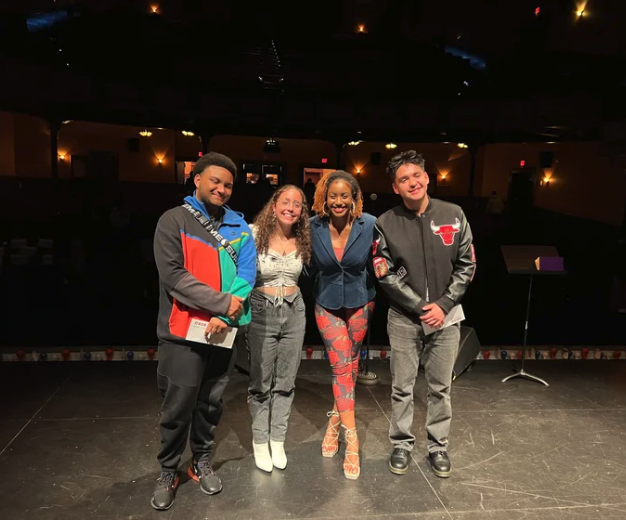A blog post by
Cecelia Allentuck, Publishing Intern
Performing in “New Britain's Got Talent” as a guest poet (c. 2023)
Writing has always been a source of comfort for me, a way for me to work through feelings and share myself with others. Like any person, I have my flaws. My drive to win can sometimes be a great tool for achieving success, but it can consume me in little moments, like when I am playing a board game, or switching lanes on the highway. When I first started competing in poetry slams, I was a bit concerned about the potential downside of injecting competition into the comfort zone of my creative life. I didn’t anticipate how writing for a judge would actually make me more accepting of my competitive spirit.
A poetry slam is a competition with scores based on both writing and performance. Oftentimes, you must prepare three poems (sometimes more, sometimes fewer) and deliver them in under 3 minutes each—with a 10-second grace period. In my experience, the topic of each poem can range from politics to perfume marketing to stubbing your toe. Anything goes!
“Am I good enough? Am I receiving better scores? Will I ever be as good as the other writers are?”
The first time I competed, I was just 15 years old, and I had no idea what I was in for. I had performed at open mics, so as I entered my name into the waiting list of performers, I thought, “What could be so different?” I was excited to perform the same way I always had, only this time there was a monetary prize, plus bragging rights attached to the opportunity.
All of the other poets were professionals. They had done this so many times before, they could do it in their sleep! There I was, on stage, with a printout of my poem that I read off to the crowd. “Mmms” and “ahhs” and “oohs” and finger-snaps clicked their way around the room... and then I was eliminated, first round.
So I worked harder. I watched slam poets perform, studied their movements, listened to the way they twisted words to mean multiple things at once. I wrote and wrote and sang and performed in my kitchen night after night.
Top 3 youth poets (I’m 2nd from left) with host and organizer LyricalFaith (3rd from left), at 2023 Northampton (MA) Academy of Music Regional Youth Poetry Slam, where I won second place
I wanted to win! I wanted to show the world—and myself—that I was the best. My next slam... I was eliminated, first round. The following slam, however, I made it to bout 2. Then bout 3. Finally, it was going to happen! That champion title was going to be mine! And... I got second place.
2024 Academy of Music Regional Youth Poetry Slam, where I won first place
The following year, I returned to the same slam competition. This time, I was not going home without a win. My legs were shaking as I waited for my turn and listened to the other poets. Everyone competing was so talented, and I was sitting there wishing I could write the way he did, or project my voice the way she did. My competitive side was eating away at the part of my brain that loved to write and perform. To my delight, I left that night with the win I had worked for. It felt great. But I also realized that what felt even better were the personal connections, the friendships I had made in a single night.
A year after winning that slam, I entered an even bigger one as part of a team. My team was phenomenal, with poets who continue to inspire me even months later. But even on a team, my competitive side made me question, “Am I good enough? Am I receiving better scores? Will I ever be as good as the other writers are?”
Slowly, I noticed how these thoughts were chipping away at my creativity and contributing to a negative mindset. I began to push against these thoughts to recognize that inspiration from other poets did not diminish my own writing. In fact, it only affirmed that I was creative and talented because I could notice and appreciate other people’s gifts.
At right, with University of St. Andrews Slam Poetry team, competing at UniSlam 2025 in Birmingham, UK. We made it to semi-finals, achieving third place in our bout.
When I fully accepted these truths, my competitive spirit stopped working against me. Instead it began to help me write poems that felt true to me and could impact an audience of judges, with the understanding that not everything I shared would connect with every reader, judge, or audience member. Maybe I’d go home with a trophy or two, but I came to accept that the point of writing, practicing, performing, losing, and trying again was to challenge myself and others. To find inspiration and make lasting connections. To become the best version of myself, even if there was no medal to name me a winner.
And so, I embraced being competitive without being against anyone—whether it be the judges, other poets, or even myself. I learned that when you go on stage and share your truth, you must be ready for someone not to understand it in the way you do. Your truth is your own, and sometimes their truth tells them something different. That is OK—in fact, this may be the whole point of writing in any capacity: to share your thoughts and feelings and memories and ideas, and then let go, allowing those who encounter your words to make their own meaning with the poem you’ve given them.
Cecelia Allentuck is the summer 2025 publishing intern for Modern Memoirs, Inc.





